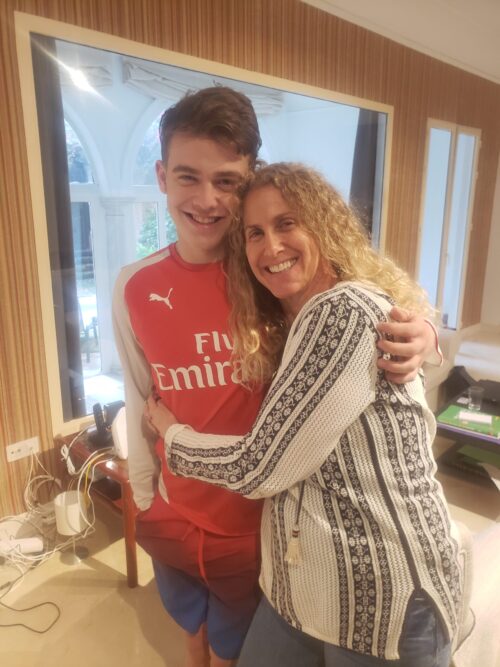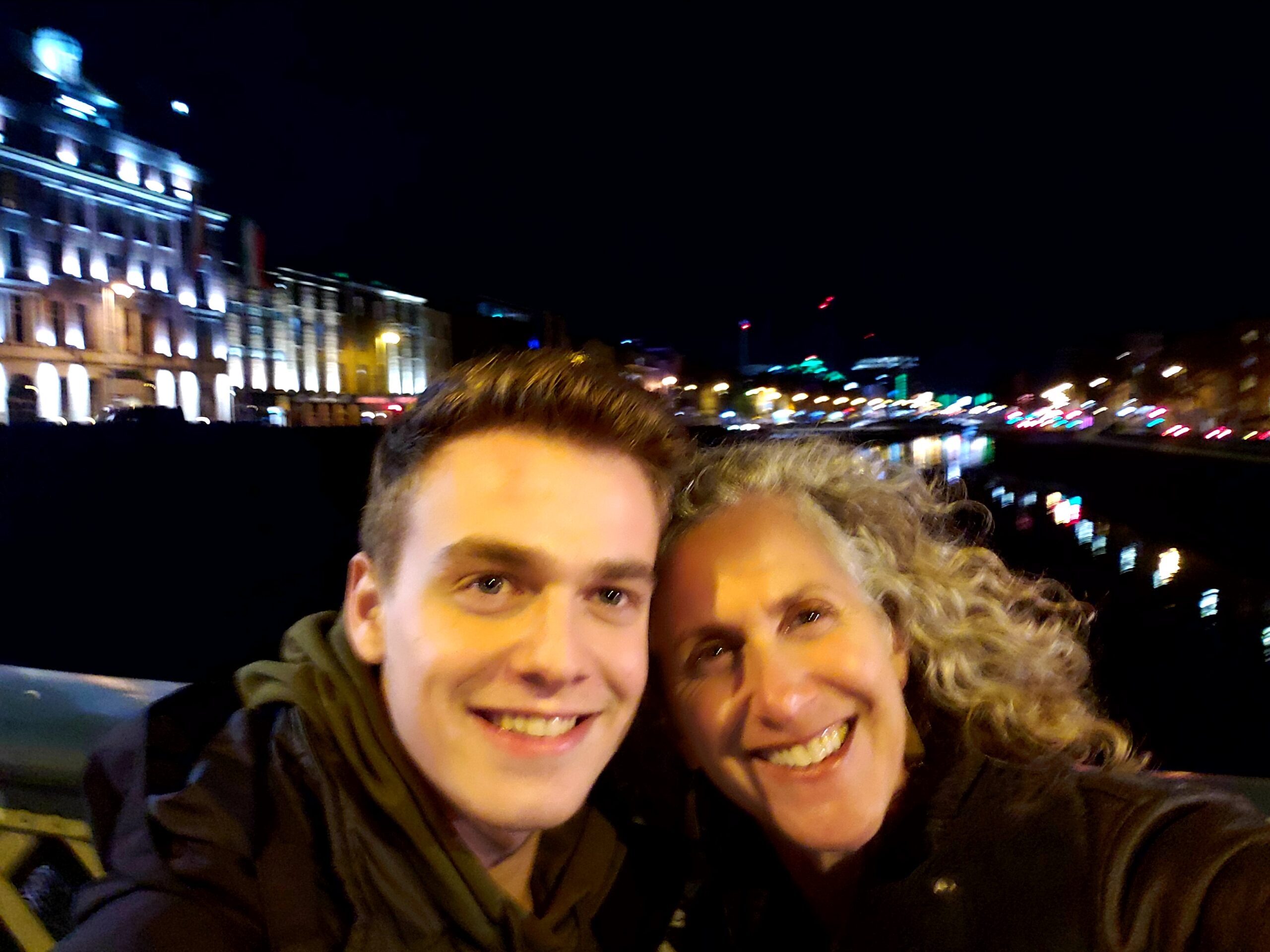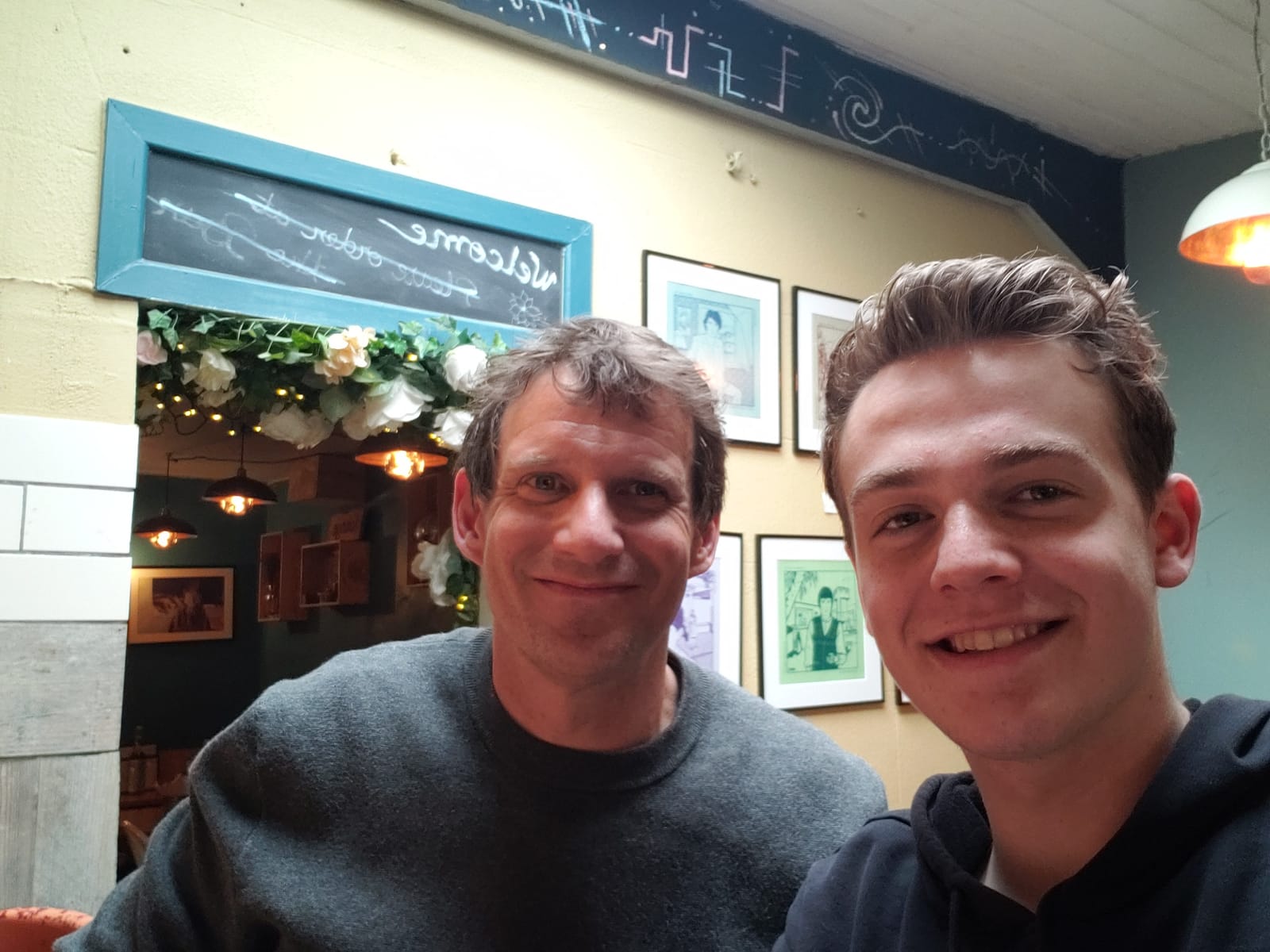Choosing College in Europe
Why We Chose College in Europe for our Son’s Higher Education
Our son goes to college in Europe. He just started year two of a four year business degree in Ireland. As Americans, we hadn’t planned for him to go to college in Europe. We’d hoped he might study abroad a bit, but a full degree program overseas? We had no relationships with European universities nor how to apply to one. (We now know their processes are nothing like in the US.) In the end, a fortunate series of rather random events led our son to choose college in Europe for his higher education.
Starting Down the College Planning Path
Planning for college is difficult. COVID made it even harder. Our son virtual schooled from the fourth quarter of his junior year through graduation. It wasn’t exactly conducive to a college planning mindset.
He knew he wanted to go to college, yet couldn’t really articulate why. A kitchen job had inspired some curiosity about the restaurant industry. That pointed him to consider business programs. Still, key challenges remained.
Gavin had never stepped foot on a college campus. Then, in the fall of 2020, campus visits weren’t happening. Virtual tours, online college fairs and Zoom application seminars had their limits. Right when a senior should be hitting it hard on college applications, the chaos of the times had taken its toll. We put college planning on pause, and agreed he would take a gap year.
We didn’t know it in the moment, but that gap year decision would inspire some self inquiry for all of us. It lead us to examine possibilities we hadn’t been considering.
Our Shifting Attitude Towards the American College Landscape

My husband and I, both liberal arts graduates, saw value in higher education simply for the sake of it. Or so we thought. Our son’s academic journey, coupled with the price tag of a US college degree, left us wondering.
We saw college as more than mere career training. We believed attaining a degree conferred other benefits, tangibly and intangibly. We knew those years can leave lasting memories and build meaningful friendships. We didn’t want to deprive him of that. Yet we couldn’t quite line up those positives with other realities.
I thought back to my own college years. Classes in my major, I thoroughly enjoyed. All those liberal arts requirements? II remember them now solely for how irrelevant they’ve remained to this very day. Gavin was a strong student when he connected with the material. It was really hard to imagine him sitting through intro to tribal anthropology, or physics for poets.
And the cost? Those courses totaled over two semesters worth of credits. A whole year’s tuition! Within reason, we could (mostly) afford out of state tuition, or certain private universities. Did that alone justify the expense? Without any real focus — or even with it — we had to ask ourselves, what’s the true end game here?
Turning our Eyes Towards College in Europe
After Gavin graduated, our family moved to Sevilla, Spain, where we had lived previously. With his diploma now in hand, and life in a calmer place, it was time to discuss what might come next.
That October, we pulled out the notes on the US universities that had caught his attention prior to the gap year decision. I don’t know exactly why, but something had shifted. Something simply didn’t feel right.
Those discussions to articulate some purpose for college, both generally speaking and for Gavin personally, had clearly raised some questions. To answer those questions, we needed more information. We needed to explore alternatives, to even know what alternatives might exist. We needed to be sure we weren’t sending our son off to college simply for lack of awareness of other possibilities.
We put those notes away and, among other considerations, turned our eyes towards college in Europe.
How We Researched Colleges In Europe
It was one thing to decide to explore colleges in Europe. It was another to figure out how. Despite our time in Spain, we still didn’t know how to research European universities. Critically, we didn’t know how to apply to them. Fortunately, I had one resource at my disposal.
Back in 2018, a friend sent me a link to Beyond the States, a college counseling service that helps Americans pursue higher education in Europe. Interesting, I recall thinking. But Gavin had just started high school. We were navigating our first move to Spain. College seemed far away. I noted the link in a spreadsheet somewhere, and didn’t think further of it. Until a couple years later, this is, when it became relevant for a different reason.
Also in 2018, I launched a consulting business helping Americans move to Spain. As it grew, parents increasingly asked me about education. One persistent concern — how might moving a high schooler overseas impact college prospects? I remembered Beyond the States and reached out to then owner, Jenn Viemont.
Viemont spoke passionately about the university systems in the US versus Europe. She took time to address those concerns my clients were experiencing. She even explained how an overseas move in high school might play out differently applying to college in Europe versus the US. All in all, the conversation gave me a birds eye view of the European college landscape. Nonetheless, we still hadn’t considered it for Gavin, as he hadn’t been happy in Spain when we’d lived there previously.
Now, things had shifted. Gavin was open to the idea. Our youngest was in ninth grade. That business inquiry was now personal. I reached out to Beyond the States again, this time as a prospective client.
Making the Most of Beyond the States Resources
From that interview with Viemont, I knew Beyond the States offered support options ranging from private counseling to DIY. I figured we’d go DIY, but contacted Viemont directly, before purchasing, to get her thoughts.
She replied almost immediately with some critical information. The European application timeline was totally different than that of the US. It was only October and rolling admissions at several European universities were already underway. Others would soon follow. This didn’t negate the possibility of applying later, but the message was clear. If we were targeting enrollment the following fall, we’d need to act quickly.
With that intel, I opted instead for a Beyond the States’ consultation package. It included a Personalized Best Fit List, private one hour follow up call, and other resources. It paid off in spades, and not only because of the timeline crunch.
From that previous interview with Viemont, I knew that there was little notion of an undeclared major in Europe. Viemont now explained that when you apply to a university in Europe, you don’t just apply to the university. You apply to a specific course (aka major, in our US college lingo).
Gavin still lacked clarity on an exact path of study. How would he filter a search among the 1200 plus options in the BTS database? Without a doubt, the curated Best Fit List made that concern a non issue.

Our Personalized Best Fit List
The intake form Gavin filled out to generate his Best Fit List was impressively thorough. It was clearly aggregating a wide variety of data points to tailor a list specific to him. Among the key areas addressed were:
- GPA, test scores and other academic metrics
- Favorite and least favorite classes from high school
- Academic challenges (such as ADHD)
- Hobbies, interests and work experience that might point to areas of study
- Lifestyle, location and setting preferences
Even better, the nature and structure of the questions forced that self inquiry that Gavin had been lacking. That “what’s the point of college” question he hadn’t been able to answer that had been nagging at his dad and I. Finally, he began to articulate some goals for wanting higher education.
Less than two weeks later, Gavin received a list with ten programs across five different universities! More than we had expected.
First, an introduction explained how his profile pointed to varying types of business programs. Some were general management ones. Others, drawing from that restaurant interest, were specific to food, tourism and hospitality.
Next, each option was reviewed in depth and included:
- A summary of each university’s program(s)
- Accreditation, duration and tuition information
- Requirements for internships or work experience
- Partner universities he could attend for part of the course
- Stats and highlights of the university as a whole
- Pros and cons with respect to location, housing, and student life factors
- Application procedures, rolling admissions dates and deadlines for financial aid consideration
Finally, each course was noted for likelihood of an acceptance. All were within reach. One of them, we’d learn on our follow up call, was even guaranteed.
Guiding Us Through the Admissions Process
For the first time since starting down the college planning path, we could enjoy the excitement without all the overwhelm. Gavin now had a solid list of viable opportunities in Spain, France, Croatia, the Netherlands and Ireland. The follow up phone call was critical to next steps.
Viemont had visited almost all the campuses on his list, providing personal insight we couldn’t gain online. Next, she walked us through the application process. All operated on a rolling admissions basis. Viemont knew exactly how long each university would take to respond once they received his application, and exactly how long he’d have to accept an offer.
This data was key. It meant Gavin could apply to his top preference only. If rejected, apply to the next one and so on. Unsure of his top choice? Apply to two (or more), and decide later if he received multiple offers.
The best bit of intel, however, was Viemont’s knowledge that he was guaranteed acceptance at the program in the Netherlands. Why? The university publishes its admissions criteria and if you meet it, you’re offered a spot. Gavin met it. Therefore, Viemont explained, if that program was most appealing, apply to it and be done. If not, consider it a safety school, and apply to the other courses first.
No wasting countless hours applying to universities he didn’t really want to attend. No waiting endless winter months for answers.
That bit of counsel alone — priceless.

From Application to Enrollment in Under Two Weeks
Heeding that application strategy, Gavin could focus his attention on his options. Additional input from our call was pivotal to ranking his choices.
Viemont told us to look up each program’s class modules — a semester by semester progression of classes taken in that course. This side by side comparison revealed notable differences in structure and content between seemingly similar programs. In the end, Culinary Entrepreneurship at TU Dublin — a business program specific to the restaurant and food marketing industry — came out on top.
He applied.
We expected to wait four weeks.
One week later, he received a conditional offer!
Suddenly, time was of the essence. He had two weeks to accept the spot. To make that conditional offer formal, they needed official copies of records we’d provided by scan. There were a few hiccups. TU Dublin wasn’t linked to the the ACT board’s network to receive scores electronically. His high school guidance counselor found a workaround. Next thing we knew, he had formal offer in hand.
But we still hadn’t ever been to Ireland, let alone toured this campus. COVID raged on. Could we even go? In this regard, it was lucky we were living in Spain. Travel with Ireland was open. (It would close one week later.) The school’s director agreed to a private tour. The weather was brutal, but that trip served its purpose. We came home and made the deposit.
And suddenly, almost anticlimactically, Gavin’s “where will I go to college” journey had come to an end.
The Upsides of College Life in Europe

Now into his second year, college in Ireland has provided many wins.
First, his course’s structure suits his learning style. Practical classes, like cooking, precede related lecture classes, like restaurant finance. “Boring” classes, like nutrition, are tolerable for their relevance to the degree.
Second, his housing complex is home to students attending universities all over Dublin, expanding his social circles and connection to other areas of the city.
Third, in year one, he traveled to Sweden, Hungary, Italy, Slovenia, Malta, Andorra and other parts of Ireland. (Sometimes he even fits in visits to us in Spain.)
Fourth, our cost for tuition plus housing (which isn’t cheap in Dublin) is less than half what we’d pay as out of state residents at the least expensive school he’d been eyeing in the US.
Finally, and most gratifying as a parent, his independence and self confidence have grown beyond belief. Indeed, we’ve witnessed first hand what Viemont pointed out in that interview long ago. “In Europe, they treat you like an adult, and expect you to act like one.” He had no “freshman dorm.” He buys his own groceries to make his own meals. He books all that international travel on his own. In short, he “figures stuff out” now in a way he hadn’t before.
Would a year of college in the US have kept pace in this regard? We’ll never know, of course, but honestly, I don’t think so. Living in a foreign country forces you to constantly adjust to new stimuli, accelerating this growth we were seeing in Gavin. It’s one of the main reasons wanted our kids to live abroad in the first place.
Of Course, Nothing is Perfect
That all said, college in Europe hasn’t been without a few disappointments.
Those “hands on” classes are exclusive to students in his year of his program only and enrollment his year was particularly low. Over time, lecture classes that combine students enrolled in similar courses will supplant these practical ones. For now, though, he laments the limited pool of classmates.
As a mom, I’ve been disappointed in TU Dublin’s lack of support for its international students. Other universities, so I’ve heard, have dedicated orientations, advisors, and immigration guidance for their foreign students. We got none of that.
Lastly, Gavin has questioned “missing out” on an American college experience — the archetype of football games, big house parties, and other visions of campus life seeded by pop culture and reinforced by Instagram. I’ve felt this a bit even as a parent — there’s been no “parents weekend,” for example. When you choose college in Europe, you’re not only choosing an alternate education path. You’re choosing an alternate experience altogether.
In our case, for Gavin and us as a family, the value he’s gaining far outweighs that bit of loss. Maybe we’re biased. We moved as a family to Spain for no reason other than wanting to. Clearly, we see inherent value in an overseas life experience. College in Europe won’t be for everyone, but in my opinion, it’s worth the investigation. You never know what you might find.



